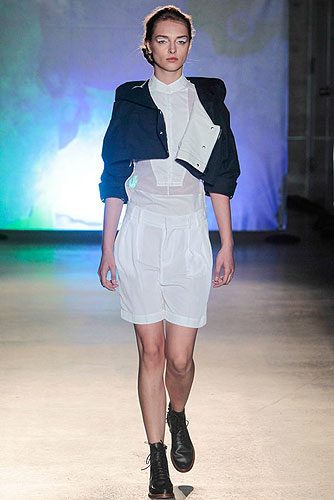

























Watching Maison Martin Margiela's MM6 show was like taking a deep breath of icy air.
www.maisonmartinmargiela.comNewYorkFashion WeekFashion Brand
Watching Maison Martin Margiela's MM6 show was like taking a deep breath of icy air.
Watching Maison Martin Margiela's MM6 show was like taking a deep breath of icy air. At first glance, Spring's clean lines, refreshing colors, and straight silhouettes looked the epitome of simple—and they were. But many of the pieces were terribly clever in that they completely tricked the eye. Take the round handbags, for instance: They were smartly sculpted to look as though they were consistently slouching. Or the finale look: You think that's a tuxedo paired with that bibbed blouse? Wrong. It's a glorified tracksuit.
Transparency was an MM6 focus this season—something we probably should have guessed after receiving the invite (a bottle of bubbles) or watching the serene projections of soapy spheres float across screens on the runway. A paper-thin white sheer T-shirt was shown over a V-neck lapelled vest-dress—the cerebral house's take on underwear-as-outerwear. Meanwhile, a structured trapeze frock was constructed from lace trapped in a see-through film, and a few of the models wore moccasins that were totally translucent. The overall effect was space-age angel.
Unlikely proportions were important to the lineup, too. Early on in the show, an airy white shirtdress was sent out with an electric pink hyper-cropped hooded jacket, the hem of which just hit the bust. Later, the same shape appeared as a capelet on a sporty coat in the same hue. Speaking of hues, pops of baby blue, teal, and tangerine were used sparingly to liven up the otherwise quiet palette of lavender, black, navy, and white. And two prints—a photo-realistic image of a winding staircase, and a rendering of the bright cerulean sky and "Opening Hours" sign outside the Maison's Tokyo boutique—were so weird that they worked. Bottom line? This collection's approach to basics was thoughtful enough to intrigue, and the clothes were practical enough to serve as the building blocks of a real-world wardrobe.